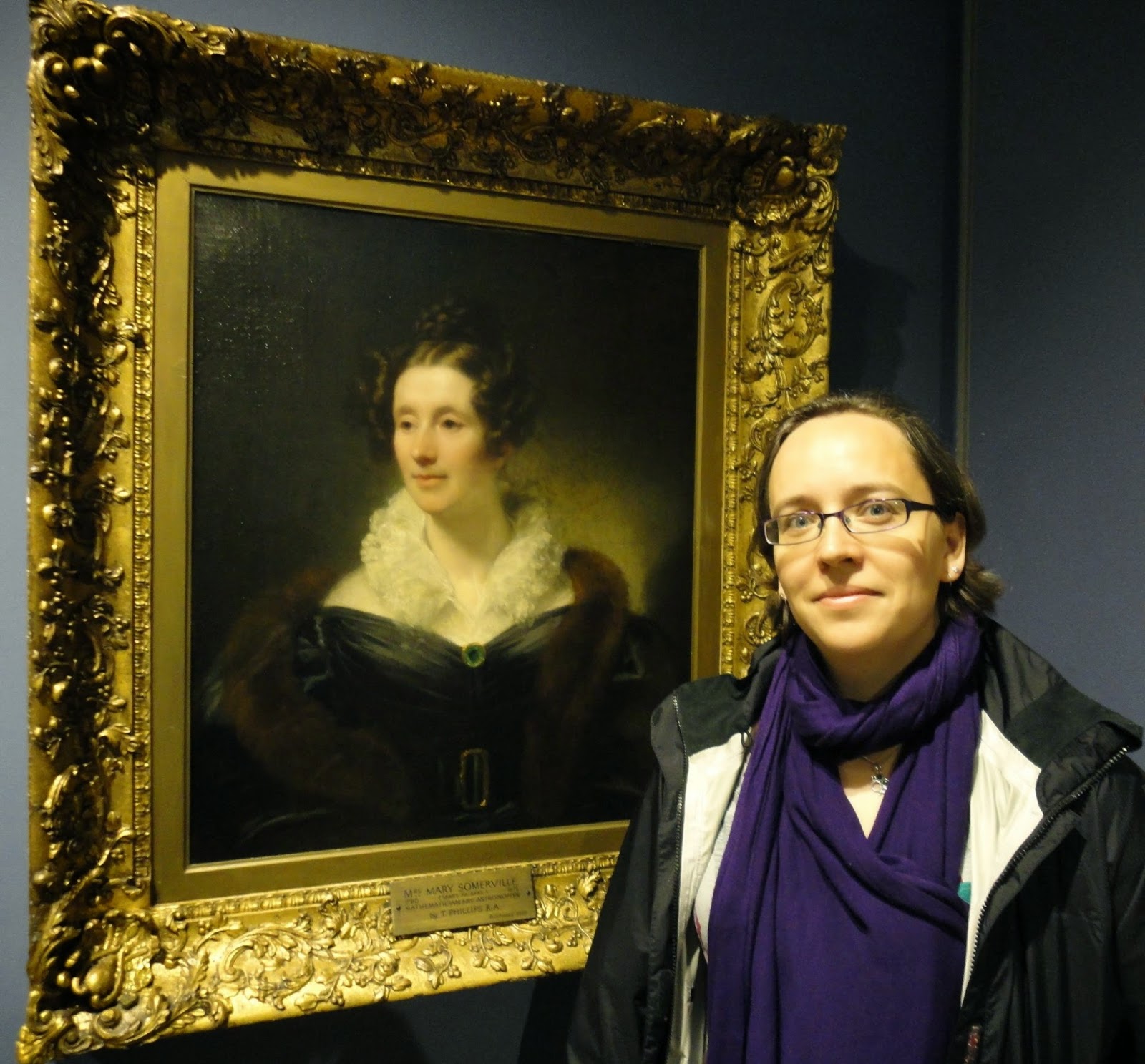Subscribe to our newsletter
Mary Somerville and the Mechanism of the Heavens #MySTEMrolemodel
As part of Digital Science’s celebrations for Ada Lovelace Day, for October we are running a series of blog posts where inspiring women in STEM are sharing their personal role models. Anyone can get involved and we encourage you to share your role model on social media using the hashtag #MySTEMrolemodel. We are also sponsoring Ada Lovelace Day Live! 2015 and hosting a free event on women in STEM, with a fantastic panel to get the discussion going. The event is taking place on October 14th at our London office, find out more and register for it here. (Registration Closed)
Dr. Karen Masters is a Reader in Astronomy and Astrophysics at the Institute of Cosmology and Gravitation, University of Portsmouth. Originally from North Warwic kshire (near Birmingham), she did her undergraduate degree in Physics at the University of Oxford (Wadham College) and then moved to the US to do a PhD in Astronomy at Cornell University. After 3 years as a postdoc at the Center for Astrophysics at Harvard University (in Boston, USA) she moved back to the UK in 2008 to work at the University of Portsmouth. In her research Dr. Masters investigates how galaxies in our Universe form and evolve. She is the Project Scientist for the successful, Galaxy Zoo project (www.galaxyzoo.org) – one of the most productive citizen science projects in existence. Dr Masters is also a member of the Sloan Digital Sky Survey (www.sdss.org) – which has a mission to map the expanding Universe. She is Director of Outreach and Public Engagement for SDSS as well as having leading role in the MaNGA (Mapping Nearby Galaxies at APO) survey which is in the middle of observations on the Sloan telescope. Dr. Masters was the 2014 Women of the Future in Science, and also one of the BBC 100 Women of 2014. She tweets as @KarenLMasters.
kshire (near Birmingham), she did her undergraduate degree in Physics at the University of Oxford (Wadham College) and then moved to the US to do a PhD in Astronomy at Cornell University. After 3 years as a postdoc at the Center for Astrophysics at Harvard University (in Boston, USA) she moved back to the UK in 2008 to work at the University of Portsmouth. In her research Dr. Masters investigates how galaxies in our Universe form and evolve. She is the Project Scientist for the successful, Galaxy Zoo project (www.galaxyzoo.org) – one of the most productive citizen science projects in existence. Dr Masters is also a member of the Sloan Digital Sky Survey (www.sdss.org) – which has a mission to map the expanding Universe. She is Director of Outreach and Public Engagement for SDSS as well as having leading role in the MaNGA (Mapping Nearby Galaxies at APO) survey which is in the middle of observations on the Sloan telescope. Dr. Masters was the 2014 Women of the Future in Science, and also one of the BBC 100 Women of 2014. She tweets as @KarenLMasters.
“Many people evidently think the science of astronomy consists entirely in observing the stars, for I have been frequently asked if I passed my nights looking through a telescope, and I have astonished the enquirers by saying I did not even possess one.”
– Mary Somerville, Personal Recollections (1874).
I’m an astronomer, and I’m a fan of Jane Austen. So when I learned that there was a British Mathematician, roughly contemporary with Jane Austen, who first developed an interest in the “mathematics of the heavens” through reading about algebra in a women’s fashion magazine at a society tea party (an event I could well imagine depicted in an Austen novel), well I was hooked.
I was also shocked that I had never heard of Mary Somerville before. She was one of the first two women admitted into the Royal Astronomical Society (in 1836 as an “Honourary Member” along with Caroline Herschel) – surely I should have come across her before 2012 – at that point I had already been working as an astronomer for more than a decade!
Indeed in the 1820s and 1830s Mary Somerville’s fame was undeniable. She was the first women to author a paper for the Royal Society (admittedly only possible because her husband was a member), she wrote the first English translation of Laplace’s “Mechanique Celeste” (the Mechansim of the Heavens”), her version of which is credited with bringing calculus to wide use in the English speaking world, and with laying out many of the derivations which greater clarity than Laplace. It was the standard text at Cambridge University for years. She became famous as a populariser of science, writing in “The Connexion of the Physical Science” the first definition of the scientific topics we now consider naturally grouped together as physics. She continued to write scientific texts into her 90s.
 Mary Somerville was also a mentor of Ada Lovelace (of calculating machine fame). She encouraged Lovelace (who was more than 30 years her junior) in the study of mathematics. The pair corresponded regularly, and Lovelace stayed with the Somervilles several times.
Mary Somerville was also a mentor of Ada Lovelace (of calculating machine fame). She encouraged Lovelace (who was more than 30 years her junior) in the study of mathematics. The pair corresponded regularly, and Lovelace stayed with the Somervilles several times.
In her later life Somerville wrote an autobiography “Personal Recollections from Early Life to Old Age, with selections from her correspondence”, published (and edited) posthumously by one of her daughters. It’s great fun to read about Somerville in her own words. She’s a women I find it easy to relate to. She was a committed advocate for the education of women, writing at age 89 “Age has not abated my zeal for the emancipation of my sex from the unreasonable prejudice too prevalent in Great Britain against a literary and scientific education for women.”, and recalling her younger self: “I was intensely ambitious to excel in something, for I felt it in my own breast that women were capable of taking a higher place in creation than that assigned to them in my early days, which was very low. “.
Mary Somerville had to work hard for her achievements. She was almost completely uneducated as a child, and didn’t start a proper study of mathematics until her 30s, as a widow with two small children. Even once successful, she felt unable to fully devote herself to mathematics, commenting that “Mathematics are the natural bent of my mind. If I had devoted myself exclusively to that study, I might probably have written something useful” and lamenting that “I never made a discovery myself, [] I had no originality” (which I claim as an early example of imposter syndrome in a female scientist).
In fact Somerville came close to discovering the planet Neptune, commenting in her book (almost 10 years before the discovery) that disturbances in the orbit of Uranus might point to an unknown planet, words that John Couch Adams claimed inspired his later work which lead to the discovery (also independently predicted by Urbain Leverrier).
As a professional astronomer I love these words from Somerville, recollecting when she first discovered astronomy as a mathematical subject:
“I perceived, however, that astronomy did not consist [of just] stargazing”
– Mary Somerville
with the delightful footnote, expressing so common a sentiment among professional astronomers today:
“Many people evidently think the science of astronomy consists entirely in observing the stars, for I have been frequently asked if I passed my nights looking through a telescope, and I have astonished the enquirers by saying I did not even possess one.”
I’ve been lucky to be able to spend more time with Somerville, as I worked on a book Chapter about her life: “Mary Somerville and the Mechanisms of the Heavens”. This chapter is coming out in a new anthology of Women in STEM “More Passion for Science: Journeys into the Unknown” in time for this year’s Ada Lovelace Day. If you are currently unaware of Mary Somerville, I hope you enjoy “meeting” her as much as I have.



